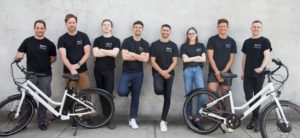Ambi Robotics, a startup developing supply chain automation hardware, closed a $26 million Series A round led by Tiger Global Management with participation from Bow Capital, Vertex Ventures US, and The House Fund on September 14, 2021.
In a statement, the company said that the total funding received by the company to date is more than $36 million after this fresh infusion. The Emeryville, California-based startup noted that the funds would enable Ambi to scale its team, operations, product, and customer support offerings.
Business in the time of Pandemic
Ambi Robotics was cofounded as Ambidextrous in 2018 by five roboticists at the University of California, Berkley. After initial hiccups, Ambidextrous went out of buzz, only to return from stealth in March 2021 and was rebranded as Ambi. Out of the abyss of namelessness, the company is having a dream run now.
The growth can be attributed to the fact that the US is experiencing. It is a 22 percent year-over-year increase in packages shipped annually, leading to sky-high demand for warehouse workers to support the growth.
Several companies with heavy warehouse footprints reported labor pressures in the first half of 2021, as employment in the sector slumped. Increasingly, many of these companies are looking to automation to fill the gap — one source predicts the warehouse automation market will be worth $30 billion by 2026.
However, the Pandemic has acted as a catalyst as the demand for e-commerce skyrocketed and the need for warehouse automation.
“The pandemic shifted consumer behavior from in-store to online, especially with the closing of brick-and-mortar stores. While e-commerce volume was already on the rise, the adoption of automation was accelerated as companies needed to expedite fulfillment with reduced labor due to distancing, health and safety standards,” said Jim Liefer, CEO
“On day one, Ambi AI-powered robotic systems can pick and place a wide variety of parcels including bags, boxes, and envelopes of various shapes and sizes, working collaboratively with humans to double throughput over existing manual processes,” added Liefer.
From an idea pitch for Amazon to a full-fledged company
Goldberg, a professor at UC Berkeley, who has been researching robot grasping robots for 35 years as an academic, presented the technology to Amazon founder Jeff Bezos during private robotics and AI event in Palm Springs, California, in 2018.
Ken Goldberg is a distinguished professor and chair of the industrial engineering and operations research department at UC Berkeley who’s published over 170 papers on algorithms for robotics and automation.
Amazon later made a move to obtain it, but Ambi ultimately rebuffed the company. After a breakthrough on a Dex-Net system, Goldberg and Jeff Mahler, a former doctoral student, set up Ambi in 2019, along with other scientists and engineers from the university.
AI powering robotic labor
Ambi Robotics combines AI, simulation, and modular hardware to build dexterous robotics that scale with companies’ operations. The company’s products, AmbiSort and AmbiKit, deliver a multi-robot system that builds unique kits from item sets and an operating system that “teaches” robots to pick and pack millions of items.
It uses Dex-Net, short for Dexterity Network, an AI system that trains on thousands of images of 3D models of objects. Using deep learning, the system scans the data and uses algorithms to learn how to pick up the objects.
“Publicly, we can discuss that we are working with Pitney Bowes as we deploy AmbiSort systems across their US hubs,” Leifer said. “With the recent funding, we will continue scaling our fleet of AI-powered robots across the US while growing the team further in 2022 to support that rapid growth,” he added.

































